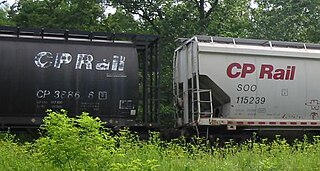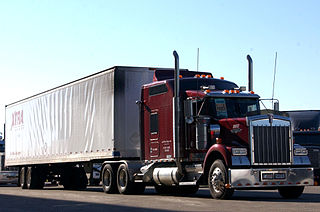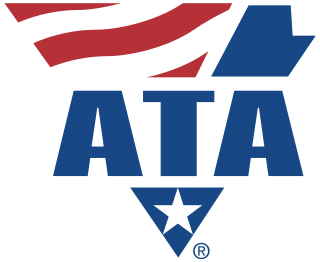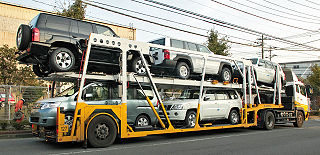
In transportation, freight refers to goods conveyed by land, water or air, while cargo refers specifically to freight when conveyed via water or air. In economics, freight refers to goods transported at a freight rate for commercial gain. The term cargo is also used in case of goods in the cold-chain, because the perishable inventory is always in transit towards a final end-use, even when it is held in cold storage or other similar climate-controlled facilities, including warehouses.

A reporting mark is a code used to identify owners or lessees of rolling stock and other equipment used on certain rail transport networks. The code typically reflects the name or identifying number of the owner, lessee, or operator of the equipment.

ISO 6346 is an international standard covering the coding, identification and marking of intermodal (shipping) containers used within containerized intermodal freight transport by the International Organization for Standardization (ISO). The standard establishes a visual identification system for every container that includes a unique serial number, the owner, a country code, a size, type and equipment category as well as any operational marks. The register of container owners is managed by the International Container Bureau (BIC).

Rail freight transport is the use of railroads and trains to transport cargo as opposed to human passengers.
Truckload shipping is the movement of large amounts of homogeneous cargo, generally the amount necessary to fill an entire semi-trailer or intermodal container. A truckload carrier is a trucking company that generally contracts an entire trailer-load to a single customer. This is as opposed to a less-than truckload (LTL) company that generally mixes freight from several customers in each trailer. One advantage Full Truckload (FTL) carriers have over Less than Truckload carriers is that the freight is never handled en route, whereas an LTL shipment will typically be transported on several different trailers. Truckload shipments are typically run on 48' or 53'dry van trailers which will hold 24 or 26 pallets respectively.

Less-than-truckload shipping or less than load (LTL) is the transportation of an amount of freight sized between individual parcels and full truckloads. Parcel carriers handle small packages and freight that can be broken down into units less than approximately 150 pounds (68 kg). Full truckload carriers move entire semi-trailers. Semi-trailers are typically between 26 and 53 feet and require a substantial amount of freight to make such transportation economical. The term LTL can refer to the freight itself, or to the carrier that transports the such freight.
Roadway Express, Inc. was an American trucking less than truckload (LTL) trucking company. Roadway Express and its holding company, Roadway Corporation, were acquired by logistics holding company Yellow Corporation in 2003, and the parent companies were merged to form Yellow Roadway Corporation, later renamed YRC Worldwide. In 2009, Roadway Express was merged with YRC's other national LTL carrier, Yellow Freight, to form YRC, Inc.

Knight-Swift Transportation Holdings Inc. is a publicly traded, American motor carrier holding company based in Phoenix, Arizona. It is the fifth largest trucking company in the United States. The company's primary subsidiaries are truckload carriers Knight Transportation, Swift Transportation, Midnite Express and, since July 2021, less than truckload (LTL) carrier AAA Cooper. In January 2022, the company expanded its LTL footprint with the acquisition of Midwest Motor Express. In July, 2023 Knight-Swift acquired truckload carrier US Xpress.

The Standard Carrier Alpha Code (SCAC) is a privately controlled US code used to identify vessel operating common carriers (VOCC). It is typically two to four letters long. The National Motor Freight Traffic Association developed the SCAC code in the 1960s to help road transport companies computerize data and records.

TForce Freight, a subsidiary of TFI International, is an American less than truckload (LTL) freight carrier based in Richmond, Virginia. The company was founded in 1935 as Overnite Transportation, the name it used until 2006 when it was rebranded UPS Freight by new owner UPS. Its name changed to TForce Freight in 2021 when UPS sold the company to TFI.
New England Motor Freight, Inc. (NEMF) was a unionized less-than-truckload (LTL) and truckload freight carrier, based in Elizabeth, New Jersey. It was one of the largest LTL carriers in the US Northeast when it entered Chapter 11 bankruptcy in 2019 and subsequently shut down all operations in 2020.

The trucking industry serves the American economy by transporting large quantities of raw materials, works in process, and finished goods over land—typically from manufacturing plants to retail distribution centers. Trucks are also used in the construction industry, two of which require dump trucks and portable concrete mixers to move the large amounts of rocks, dirt, concrete, and other building materials used in construction. Trucks in America are responsible for the majority of freight movement over land and are tools in the manufacturing, transportation, and warehousing industries.

The American Trucking Associations (ATA), founded in 1933, is the largest national trade association for the trucking industry. ATA represents more than 37,000 members covering every type of motor carrier in the United States through a federation of other trucking groups, industry-related conferences, and its 50 affiliated state trucking associations. Former Governor of Kansas Bill Graves was replaced by Chris Spear as the ATA's president and CEO in July 2016.
Pitt Ohio Express, LLC, stylized PITT OHIO, is a privately owned transportation and supply chain management company based in Pittsburgh, Pennsylvania that serves the Mid-Atlantic and Midwestern US. Pitt Ohio ranked 48th on Transport Topics Top 100 For-Hire list and 14th on its Top Less-Than-Truckload (LTL) Carriers list of US and Canadian freight carriers by revenue for 2021.

Con-way Freight was a less-than-truckload (LTL) motor carrier headquartered in Ann Arbor utilizing a network of freight service centers to provide regional, inter-regional and transcontinental less-than-truckload freight services throughout North America. The business unit provided day-definite delivery service to manufacturing, industrial and retail customers. Con-way Freight was the largest division of Con-way, Inc. with 16,600 employees, more than 365 operating locations, 16,000 dock doors and 32,750 tractors and trailers. The company was founded by Consolidated Freightways (CF) of Portland, Oregon as a non union spinoff, for less than truckload hauling. In 2009 Con-way Freight reported revenues of over $2.6 billion. Con-way Inc., including Con-way Freight and sibling company Con-way Truckload, was acquired by XPO Logistics, a primarily non-asset logistics company from Greenwich, Connecticut, in a deal worth $3.5 billion.

XPO, Inc. is an American transportation company that conducts less-than-truckload shipping in North America. The company has headquarters in Greenwich, Connecticut, U.S., and 564 locations globally.
The National Motor Freight Classification (NMFC) is a North American voluntary standard that provides a comparison of commodities moving in interstate, intrastate and international commerce via freight shipment. The standard is developed and maintained by the Freight Classification Development Council (FCDC) and published by the National Motor Freight Traffic Association (NMFTA).

An auto transport broker is a type of cargo broker that specializes in the shipping and transportation of vehicles. Most vehicles shipped in the U.S. are cars and trucks, but many brokers handle boats, RVs, motorcycles and other types of vehicles as well. Auto transport is classified as "specialized freight trucking" under NAICS code 484230.
The Commodity Classification Standards Board (CCSB) develops and maintains National Motor Freight Classification (NMFC). The CCSB is an autonomous board of three to seven full-time employees of the National Motor Freight Traffic Association (NMFTA). The CCSB's staff includes a lawyer and a packaging consultant.
A freight broker is an intermediary between a shipper and a freight service provider. Freight brokers can specialize in certain types of freight, such as equipment hauling on lowboys, oversize, bulk tanker, auto, or other types of freight transportation.













